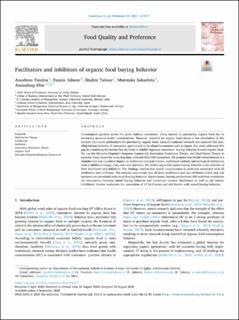Facilitators and inhibitors of organic food buying behavior
Peer reviewed, Journal article
Published version

View/
Date
2021Metadata
Show full item recordCollections
Original version
Tandon, A., Jabeen, F., Talwar, S., Sakashita, M. & Dhir, A. (2021). Facilitators and inhibitors of organic food buying behavior. Food Quality and Preference, 88, 1-14. doi: 10.1016/j.foodqual.2020.104077Abstract
Consumption patterns across the globe indicate consumers’ rising interest in purchasing organic food due to
increasing personal-health consciousness. However, research on organic food shows a low translation of this
interest into stated preferences for purchasing organic food. Limited academic research has explored this puzzling buying behavior of consumers, particularly in developed economies such as Japan. Our study addresses this
gap by examining the factors that facilitate or inhibit Japanese consumers’ buying behavior toward organic food.
We use the Stimulus-Organism-Response framework, Innovation Resistance Theory, and Dual-Factor Theory to
examine these factors by analyzing data collected from 928 consumers. We propose that health consciousness is a
stimulus that has a positive impact on facilitators (natural content, nutritional content, and ecological welfare) as
well as inhibitors (usage, risk, and value barriers). We further argue that stated buying behavior is the outcome of
both facilitators and inhibitors. The findings confirm that health consciousness is positively associated with all
facilitators and inhibitors. The analysis also reveals that all three facilitators and two inhibitors (value and risk
barriers) are associated with stated buying behavior. Furthermore, buying involvement (BI) positively moderates
the associations between stated buying behavior and nutritional content (facilitator) as well as risk barrier
(inhibitor). Gender moderates the association of all facilitators and risk barrier with stated buying behavior.
